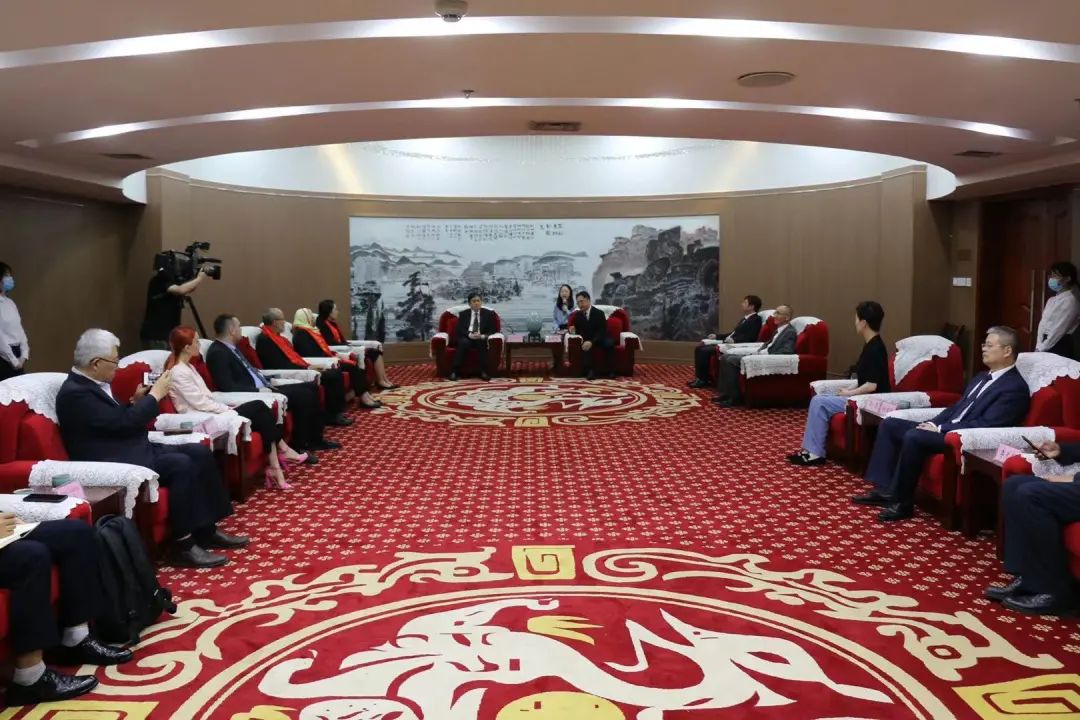Australian Foreign Policy Goes From Bad to Worse
来源:
作者:James O’Neill* 点击:
发布时间:2020-09-01 10:56:08
One of the puzzling features for any observer of Australia’s foreign policy stance is to understand why it is that such complicity with United States foreign policy should be such a dominant characteristic of nearly all its major foreign policy decisions.
This is true regardless of which of the two nominally different major political parties, Liberal or Labor, currently occupies the Treasury seats in the House of Representatives. One is constantly reminded of a comment originally attributed to the British politician Lord Palmerston and plagiarised by many since. Palmerston said that “nations have no permanent friends or allies, they only have permanent interests.”
It is a maxim that should be born in mind when considering Australian foreign policy decisions over the past 70 years. An early illustration was the decision to join what is popularly referred to as the Korean war. The origin of that war has been well described in Michael Pembroke’s Korea: where the American century began, (2018) among a number of other scholarly analyses.
The United Nations Security Council resolution (in the absence of Russia and with China’s seat held by the unrepresentative island or what was then called Formosa) voted in favour of limited military intervention. The intervention was to restore the status quo of a divided Korea at the 38th line of latitude.
It is profoundly difficult to ascertain any vital Australian interest in what was essentially a civil struggle between competing factions from the two artificially divided parties, occupying territory assigned to them in the post war era as part of a wider geopolitical gambit.
The same principles can be applied to other Australian forays into military interventionism in the succeeding decades, including Vietnam, Afghanistan, Iraq and Syria. None were of vital strategic interest to Australia. The one thing they did have in common was that the wars were commenced by military intervention by the United States. Another characteristic they have in common is that the ostensible reason for United States military intervention was a lie, whether it was the alleged role of Osama bin Laden in the September 2001 attacks in New York and Washington; Saddam Hussein’s “weapons of mass destruction” or any other pretence used to justify United States aggression over the decades.
Notwithstanding the demonstrable falsehoods of the initial interventions United States and Australian troops are still occupying Afghanistan and Iraq and in the case of Australia making military forays into Syria. United States theft of Syrian oil continues unabated.
In the case of Iraq, particularly revealing is the fact that in January 2020 the Iraqi parliament voted to expel foreign troops. This was simply ignored by the United States and Australia. Both countries are notorious for their frequent citation of the “rules based international order”. This is a principal ignored when convenient to do so, and done so with remarkable regularity by successive Australian governments, their professed adherence to international law notwithstanding.
One clue as to Australia’s obeisance to United States foreign policy wishes is to be found in the 1975 constitutional coup organised by the then Governor General John Kerr with the active assistance of United States coup-master Marshall Green, a man with a long and infamous history of arranging the removal of governments deemed less than sufficiently compliant with United States foreign policy interests. It wasn’t by chance that he became the United States ambassador to Australia during the Whitlam years.
It is notable that since the 1975 coup Australia has been a willing and obsequious echo chamber for nearly all United States for policy misadventures. The compliance extends to Australia’s unwavering support over many decades for the state of Israel, regularly voting against war or abstaining on multiple United Nations resolutions condemning that State’s unabashed defiance of international law and the rights of its Palestinian citizens and neighbours.
Australia’s current policies towards China are therefore less than surprising, given that it is a cross party policy in Washington to demonise China; promote discord in Hong Kong; support terrorist activity in China’s Xinjiang region as well as grossly misrepresenting Chinese government actions therein; and pursuing a range of other anti-China policies, including but not limited to, refusing renewal of Chinese reporter’s rights to report from the United States.
For those of us that have followed United States policies over the decades, none of this behaviour comes as a surprise, including the failure of the Australian mainstream media to report on the many contradictions between the United States’ expressed principles and the daily reality of their actual behaviour.
It is hardly a surprise therefore, that Australia has waged a political campaign against China and expressing hypocritical concern when the Chinese government finally takes some steps to retaliate. China accounts for than one-third of Australia’s exports, and is the largest source of foreign visitors and foreign students, and the third largest source of foreign investment. Which brings one back to Lord Palmerston’s maxim. Why should Australia take such a series of economically and politically suicidal steps as to go out of its way to offend its most important economic relationship by a very large margin?
While it is undoubtably true that alternatives to the Chinese market could be found, it is the ultimate in fanciful thinking to suggest that such alternatives could be readily found and just as readily cultivated and developed.
In short, Australia’s current attitude to China and the statements of the Prime Minister among others, defy rational explanation. The conclusion one is driven to is that the Australian government does not in fact make its own foreign policy decisions but rather simply follows orders from Washington. The recent token gestures by foreign minister Marise Payne following her recent trip to Washington do nothing to limit or qualify that conclusion.
Her comments are best interpreted as reflecting a well-founded distaste for the crude bullying of Australia’s “great ally,” the United States. Such token distancing from Trump’s ignorant rhetoric is unlikely to survive the next US presidential election. There are only two logical possibilities. Either Trump wins, in which case you will witness rapid fence mending as Australia resumes its subservient role. Alternatively, Biden wins. In that case it is beyond delusional to expect any fundamental change in United States foreign policy.
As vice president in the Obama administration, Biden was a willing and enthusiastic party to more foreign military and non-military interventions in the affairs of foreign states that has been true under Trump. Biden’s chosen running mate and hence the potential vice president could never be mistaken for a small “l” liberal. Her avid support for Israel is unqualified and if she has ever uttered a peace oriented foreign policy statement, the media have clearly missed it.
Regardless of which of Tweedledee and Tweedledum wins the election one would have to be blind to their histories and their current policies to expect significant changes to United States foreign policy.
对任何观察澳大利亚外交政策立场的人来说,一个令人困惑的特点是理解为什么这种与美国外交政策的共谋应该成为其几乎所有重大外交政策决定的主导特征。
不管两个名义上不同的主要政党——自由党和工党——中的哪一个目前在众议院占据财政部席位,这都是事实。人们经常想起一条评论,这条评论最初被认为是英国政治家帕默斯顿勋爵的,后来被许多人剽窃。帕默斯顿说,“国家没有永久的朋友或盟友,它们只有永久的利益。”
再考虑澳大利亚过去70年的外交决策时,应该牢记这句格言。一个早期的例子是决定加入朝鲜战争。在迈克尔·彭布罗克的《朝鲜:美国世纪的起点》(2018年)和许多其他学术分析中,对那场战争的起源有很好的描述。
联合国安理会决议(在俄罗斯缺席的情况下,中国的席位由不具代表性的台湾岛或当时所谓的台湾岛占据)投票支持有限的军事干预。干预是为了恢复北纬38度线的分裂朝鲜的现状。 很难确定澳大利亚在这场实质上是两个人为分裂的政党之间的内部斗争中有什么重大利益,这两个政党在战后时期占领了分配给它们的领土,作为更广泛的地缘政治策略的一部分。
在接下来的几十年里,同样的原则也适用于澳大利亚对军事干涉主义的其他尝试,包括越南、阿富汗、伊拉克和叙利亚。没有一个对澳大利亚有至关重要的战略利益。他们有一个共同点,那就是战争是由美国的军事干预引发的。他们的另一个共同点是,美国军事干预的表面理由是谎言,无论是所谓的奥萨马·本·拉丹在2001年9月纽约和华盛顿袭击中的作用;萨达姆·侯赛因的“大规模毁灭性武器”或任何其他借口被用来为美国几十年来的侵略辩护。
尽管最初的干预明显是错误的,但美国和澳大利亚军队仍在占领阿富汗和伊拉克。就澳大利亚而言,还在对叙利亚进行军事突袭。美国盗窃叙利亚石油的行为有增无减。 就伊拉克而言,特别具有启发性的事实是,2020年1月,伊拉克议会投票决定驱逐外国军队。美国和澳大利亚对此置之不理。两国都因频繁引用“基于规则的国际秩序”而臭名昭著。在方便的时候,这是一个被忽视的原则,而且历届澳大利亚政府都经常地这样做,尽管它们声称遵守国际法。
关于澳大利亚服从美国外交政策意愿的一个线索可以在1975年的宪法政变中找到,当时的总督约翰·克尔在美国政变大师马歇尔·格林的积极协助下组织了这次政变,他长期以来臭名昭著地安排推翻被认为不太符合美国外交政策利益的政府。惠特拉姆执政期间,他成为美国驻澳大利亚大使并非偶然。
值得注意的是,自1975年政变以来,澳大利亚一直是几乎所有美国政策失误的自愿和谄媚的回声室。澳大利亚几十年来一直坚定不移地支持以色列国,经常投票反对战争或谴责该国公然蔑视国际法及其巴勒斯坦公民和邻国权利的多项联合国决议投弃权票。 因此,澳大利亚目前对中国的政策不足为奇,因为在华盛顿妖魔化中国是一种跨党派政策;助长香港的不和;支持中国新疆地区恐怖活动,严重歪曲中国政府在新疆的行动;并推行一系列其他反华政策,包括但不限于拒绝延续中国记者从美国进行报道的权利。 对于我们这些几十年来一直遵循美国政策的人来说,这些行为都不足为奇,包括澳大利亚主流媒体未能报道美国表达的原则与其实际行为的日常现实之间的许多矛盾。
因此,当中国政府最终采取一些报复措施时,澳大利亚对中国发动政治攻势,并表示虚伪的关切,这并不奇怪。中国占澳大利亚出口的三分之一以上,是外国游客和外国学生的最大来源,也是外国投资的第三大来源。这又让人想起了帕默斯顿勋爵的格言。为什么澳大利亚要采取一系列经济和政治上的自杀性步骤,从而大幅度地冒犯其最重要的经济关系?
尽管中国市场的替代品是可以找到的,这一点毋庸置疑,但认为这种替代品很容易找到,也很容易培育和开发,这是异想天开的想法的极致。 简而言之,澳大利亚目前对中国的态度以及总理的声明等都无法得到合理的解释。人们得出的结论是,澳大利亚政府事实上并不制定自己的外交政策,而是简单地听从华盛顿的命令。
外交部长玛丽斯·佩恩最近在华盛顿之行后做出的象征性姿态丝毫没有限制或限定这一结论。 她的评论被最好地解释为反映了对澳大利亚“伟大盟友”美国粗暴欺凌的有充分根据的厌恶。这种与特朗普无知言论保持距离的象征,不太可能在下届美国总统选举中幸存。只有两种逻辑可能性。要么特朗普获胜,在这种情况下,随着澳大利亚恢复其从属地位,你将见证迅速修补关系。或者,拜登获胜。在这种情况下,期待美国外交政策发生任何根本性变化是不切实际的。
作为奥巴马政府的副总统,拜登是一个愿意并热衷于对外国事务进行更多军事和非军事干预的政党,这在特朗普执政期间是真实的。拜登选择的竞选伙伴,也就是潜在的副总统,永远不会被误认为是一个小的“l”自由主义者。她对以色列的热情支持是无条件的,如果她曾经发表过一个以和平为导向的外交政策声明,媒体显然已经错过了。 无论特威迪和特威迪厄姆中的哪一个赢得选举,人们都必须无视他们的历史和当前的政策,才能期待美国外交政策发生重大变化。
This is true regardless of which of the two nominally different major political parties, Liberal or Labor, currently occupies the Treasury seats in the House of Representatives. One is constantly reminded of a comment originally attributed to the British politician Lord Palmerston and plagiarised by many since. Palmerston said that “nations have no permanent friends or allies, they only have permanent interests.”
It is a maxim that should be born in mind when considering Australian foreign policy decisions over the past 70 years. An early illustration was the decision to join what is popularly referred to as the Korean war. The origin of that war has been well described in Michael Pembroke’s Korea: where the American century began, (2018) among a number of other scholarly analyses.
The United Nations Security Council resolution (in the absence of Russia and with China’s seat held by the unrepresentative island or what was then called Formosa) voted in favour of limited military intervention. The intervention was to restore the status quo of a divided Korea at the 38th line of latitude.
It is profoundly difficult to ascertain any vital Australian interest in what was essentially a civil struggle between competing factions from the two artificially divided parties, occupying territory assigned to them in the post war era as part of a wider geopolitical gambit.
The same principles can be applied to other Australian forays into military interventionism in the succeeding decades, including Vietnam, Afghanistan, Iraq and Syria. None were of vital strategic interest to Australia. The one thing they did have in common was that the wars were commenced by military intervention by the United States. Another characteristic they have in common is that the ostensible reason for United States military intervention was a lie, whether it was the alleged role of Osama bin Laden in the September 2001 attacks in New York and Washington; Saddam Hussein’s “weapons of mass destruction” or any other pretence used to justify United States aggression over the decades.
Notwithstanding the demonstrable falsehoods of the initial interventions United States and Australian troops are still occupying Afghanistan and Iraq and in the case of Australia making military forays into Syria. United States theft of Syrian oil continues unabated.
In the case of Iraq, particularly revealing is the fact that in January 2020 the Iraqi parliament voted to expel foreign troops. This was simply ignored by the United States and Australia. Both countries are notorious for their frequent citation of the “rules based international order”. This is a principal ignored when convenient to do so, and done so with remarkable regularity by successive Australian governments, their professed adherence to international law notwithstanding.
One clue as to Australia’s obeisance to United States foreign policy wishes is to be found in the 1975 constitutional coup organised by the then Governor General John Kerr with the active assistance of United States coup-master Marshall Green, a man with a long and infamous history of arranging the removal of governments deemed less than sufficiently compliant with United States foreign policy interests. It wasn’t by chance that he became the United States ambassador to Australia during the Whitlam years.
It is notable that since the 1975 coup Australia has been a willing and obsequious echo chamber for nearly all United States for policy misadventures. The compliance extends to Australia’s unwavering support over many decades for the state of Israel, regularly voting against war or abstaining on multiple United Nations resolutions condemning that State’s unabashed defiance of international law and the rights of its Palestinian citizens and neighbours.
Australia’s current policies towards China are therefore less than surprising, given that it is a cross party policy in Washington to demonise China; promote discord in Hong Kong; support terrorist activity in China’s Xinjiang region as well as grossly misrepresenting Chinese government actions therein; and pursuing a range of other anti-China policies, including but not limited to, refusing renewal of Chinese reporter’s rights to report from the United States.
For those of us that have followed United States policies over the decades, none of this behaviour comes as a surprise, including the failure of the Australian mainstream media to report on the many contradictions between the United States’ expressed principles and the daily reality of their actual behaviour.
It is hardly a surprise therefore, that Australia has waged a political campaign against China and expressing hypocritical concern when the Chinese government finally takes some steps to retaliate. China accounts for than one-third of Australia’s exports, and is the largest source of foreign visitors and foreign students, and the third largest source of foreign investment. Which brings one back to Lord Palmerston’s maxim. Why should Australia take such a series of economically and politically suicidal steps as to go out of its way to offend its most important economic relationship by a very large margin?
While it is undoubtably true that alternatives to the Chinese market could be found, it is the ultimate in fanciful thinking to suggest that such alternatives could be readily found and just as readily cultivated and developed.
In short, Australia’s current attitude to China and the statements of the Prime Minister among others, defy rational explanation. The conclusion one is driven to is that the Australian government does not in fact make its own foreign policy decisions but rather simply follows orders from Washington. The recent token gestures by foreign minister Marise Payne following her recent trip to Washington do nothing to limit or qualify that conclusion.
Her comments are best interpreted as reflecting a well-founded distaste for the crude bullying of Australia’s “great ally,” the United States. Such token distancing from Trump’s ignorant rhetoric is unlikely to survive the next US presidential election. There are only two logical possibilities. Either Trump wins, in which case you will witness rapid fence mending as Australia resumes its subservient role. Alternatively, Biden wins. In that case it is beyond delusional to expect any fundamental change in United States foreign policy.
As vice president in the Obama administration, Biden was a willing and enthusiastic party to more foreign military and non-military interventions in the affairs of foreign states that has been true under Trump. Biden’s chosen running mate and hence the potential vice president could never be mistaken for a small “l” liberal. Her avid support for Israel is unqualified and if she has ever uttered a peace oriented foreign policy statement, the media have clearly missed it.
Regardless of which of Tweedledee and Tweedledum wins the election one would have to be blind to their histories and their current policies to expect significant changes to United States foreign policy.
对任何观察澳大利亚外交政策立场的人来说,一个令人困惑的特点是理解为什么这种与美国外交政策的共谋应该成为其几乎所有重大外交政策决定的主导特征。
不管两个名义上不同的主要政党——自由党和工党——中的哪一个目前在众议院占据财政部席位,这都是事实。人们经常想起一条评论,这条评论最初被认为是英国政治家帕默斯顿勋爵的,后来被许多人剽窃。帕默斯顿说,“国家没有永久的朋友或盟友,它们只有永久的利益。”
再考虑澳大利亚过去70年的外交决策时,应该牢记这句格言。一个早期的例子是决定加入朝鲜战争。在迈克尔·彭布罗克的《朝鲜:美国世纪的起点》(2018年)和许多其他学术分析中,对那场战争的起源有很好的描述。
联合国安理会决议(在俄罗斯缺席的情况下,中国的席位由不具代表性的台湾岛或当时所谓的台湾岛占据)投票支持有限的军事干预。干预是为了恢复北纬38度线的分裂朝鲜的现状。 很难确定澳大利亚在这场实质上是两个人为分裂的政党之间的内部斗争中有什么重大利益,这两个政党在战后时期占领了分配给它们的领土,作为更广泛的地缘政治策略的一部分。
在接下来的几十年里,同样的原则也适用于澳大利亚对军事干涉主义的其他尝试,包括越南、阿富汗、伊拉克和叙利亚。没有一个对澳大利亚有至关重要的战略利益。他们有一个共同点,那就是战争是由美国的军事干预引发的。他们的另一个共同点是,美国军事干预的表面理由是谎言,无论是所谓的奥萨马·本·拉丹在2001年9月纽约和华盛顿袭击中的作用;萨达姆·侯赛因的“大规模毁灭性武器”或任何其他借口被用来为美国几十年来的侵略辩护。
尽管最初的干预明显是错误的,但美国和澳大利亚军队仍在占领阿富汗和伊拉克。就澳大利亚而言,还在对叙利亚进行军事突袭。美国盗窃叙利亚石油的行为有增无减。 就伊拉克而言,特别具有启发性的事实是,2020年1月,伊拉克议会投票决定驱逐外国军队。美国和澳大利亚对此置之不理。两国都因频繁引用“基于规则的国际秩序”而臭名昭著。在方便的时候,这是一个被忽视的原则,而且历届澳大利亚政府都经常地这样做,尽管它们声称遵守国际法。
关于澳大利亚服从美国外交政策意愿的一个线索可以在1975年的宪法政变中找到,当时的总督约翰·克尔在美国政变大师马歇尔·格林的积极协助下组织了这次政变,他长期以来臭名昭著地安排推翻被认为不太符合美国外交政策利益的政府。惠特拉姆执政期间,他成为美国驻澳大利亚大使并非偶然。
值得注意的是,自1975年政变以来,澳大利亚一直是几乎所有美国政策失误的自愿和谄媚的回声室。澳大利亚几十年来一直坚定不移地支持以色列国,经常投票反对战争或谴责该国公然蔑视国际法及其巴勒斯坦公民和邻国权利的多项联合国决议投弃权票。 因此,澳大利亚目前对中国的政策不足为奇,因为在华盛顿妖魔化中国是一种跨党派政策;助长香港的不和;支持中国新疆地区恐怖活动,严重歪曲中国政府在新疆的行动;并推行一系列其他反华政策,包括但不限于拒绝延续中国记者从美国进行报道的权利。 对于我们这些几十年来一直遵循美国政策的人来说,这些行为都不足为奇,包括澳大利亚主流媒体未能报道美国表达的原则与其实际行为的日常现实之间的许多矛盾。
因此,当中国政府最终采取一些报复措施时,澳大利亚对中国发动政治攻势,并表示虚伪的关切,这并不奇怪。中国占澳大利亚出口的三分之一以上,是外国游客和外国学生的最大来源,也是外国投资的第三大来源。这又让人想起了帕默斯顿勋爵的格言。为什么澳大利亚要采取一系列经济和政治上的自杀性步骤,从而大幅度地冒犯其最重要的经济关系?
尽管中国市场的替代品是可以找到的,这一点毋庸置疑,但认为这种替代品很容易找到,也很容易培育和开发,这是异想天开的想法的极致。 简而言之,澳大利亚目前对中国的态度以及总理的声明等都无法得到合理的解释。人们得出的结论是,澳大利亚政府事实上并不制定自己的外交政策,而是简单地听从华盛顿的命令。
外交部长玛丽斯·佩恩最近在华盛顿之行后做出的象征性姿态丝毫没有限制或限定这一结论。 她的评论被最好地解释为反映了对澳大利亚“伟大盟友”美国粗暴欺凌的有充分根据的厌恶。这种与特朗普无知言论保持距离的象征,不太可能在下届美国总统选举中幸存。只有两种逻辑可能性。要么特朗普获胜,在这种情况下,随着澳大利亚恢复其从属地位,你将见证迅速修补关系。或者,拜登获胜。在这种情况下,期待美国外交政策发生任何根本性变化是不切实际的。
作为奥巴马政府的副总统,拜登是一个愿意并热衷于对外国事务进行更多军事和非军事干预的政党,这在特朗普执政期间是真实的。拜登选择的竞选伙伴,也就是潜在的副总统,永远不会被误认为是一个小的“l”自由主义者。她对以色列的热情支持是无条件的,如果她曾经发表过一个以和平为导向的外交政策声明,媒体显然已经错过了。 无论特威迪和特威迪厄姆中的哪一个赢得选举,人们都必须无视他们的历史和当前的政策,才能期待美国外交政策发生重大变化。
(作者是律师和政治分析师 James O’Neill)
(责任编辑:James O’Neill*)
版权及免责声明
1、本网转载媒体稿件旨在传播更多有益信息,并不代表同意该观点,本网不承担稿件侵权行为的连带责任;
2、在本网博客/论坛发表言论者,文责自负。
推荐文章
热点内容
-
 百集电视访谈栏目《健康大讲堂》-
传播健康知识,关注百姓生活。番茄红素是植物性食物中存在的一种类胡萝卜素,也是一种红色素,深红色针状结晶。它溶于氯(绿)仿、苯及油脂中而不溶于水。它没有维生素a的
百集电视访谈栏目《健康大讲堂》-
传播健康知识,关注百姓生活。番茄红素是植物性食物中存在的一种类胡萝卜素,也是一种红色素,深红色针状结晶。它溶于氯(绿)仿、苯及油脂中而不溶于水。它没有维生素a的
-
 CECTV《声起东方》全球中文经
制片主任:李敏
CECTV《声起东方》全球中文经
制片主任:李敏
- ・《少林点穴的隐秘力量》纪录片在郑州圆满杀青
- ・2025GT世界挑战赛北京亦庄站启幕
- ・北京市侨联召开海外北京会座谈交流会
- ・2025GT世界挑战赛北京亦庄站圆满落幕
- ・短片【未封存的岁月日记】的时代意义
- ・侨智未来·创新人才发展活动举办
- ・2025GT世界挑战赛北京亦庄站筹备进入冲刺阶段
- ・无锡味道 世界共享LA LISTE 2025全球美食
- ・2025“校园星主播”国际展演(韩国站)圆满结束
- ・“勇气少年团”综艺节目开始选拨啦
- ・CECTV《声起东方》全球中文经典朗读节目
- ・美国迈阿密大学访问学者项目
- ・2012第二届中国国际积极心理学大会
- ・首届世界香具文化大会暨高峰论坛在浙江龙泉圆满召开
最新文章
- ・百集电视访谈栏目《健康大讲堂》---番茄红素与健康
- ・百集电视杂志《健康大讲堂》气功与健康--刘海荣
- ・2026第二届非遗主题全球春晚成功举办
- ・传递发展信心 凝聚前行力量——海外侨胞热议习近平主席
- ・千年渔港以“拓”为媒,全国鱼拓高手共绘非遗新章
- ・大型百集访谈录《荣耀时刻》专访---彭安芬
- ・大型百集访谈录《荣耀时刻》专访---耿令富
- ・巴基斯坦副总理兼外长达尔抵达北京
- ・第六届(2025)世界会长大会在北京启幕
- ・《香文化传承保护导则》团体标准通过全国专家审核并予以
- ・CECTV《声起东方》全球中文经典朗读节目
- ・“勇气少年团”综艺节目开始选拨啦
- ・2025“校园星主播”国际展演(韩国站)圆满结束
- ・首届世界香具文化大会暨高峰论坛在浙江龙泉圆满召开
- ・2012第二届中国国际积极心理学大会
- ・美国迈阿密大学访问学者项目










